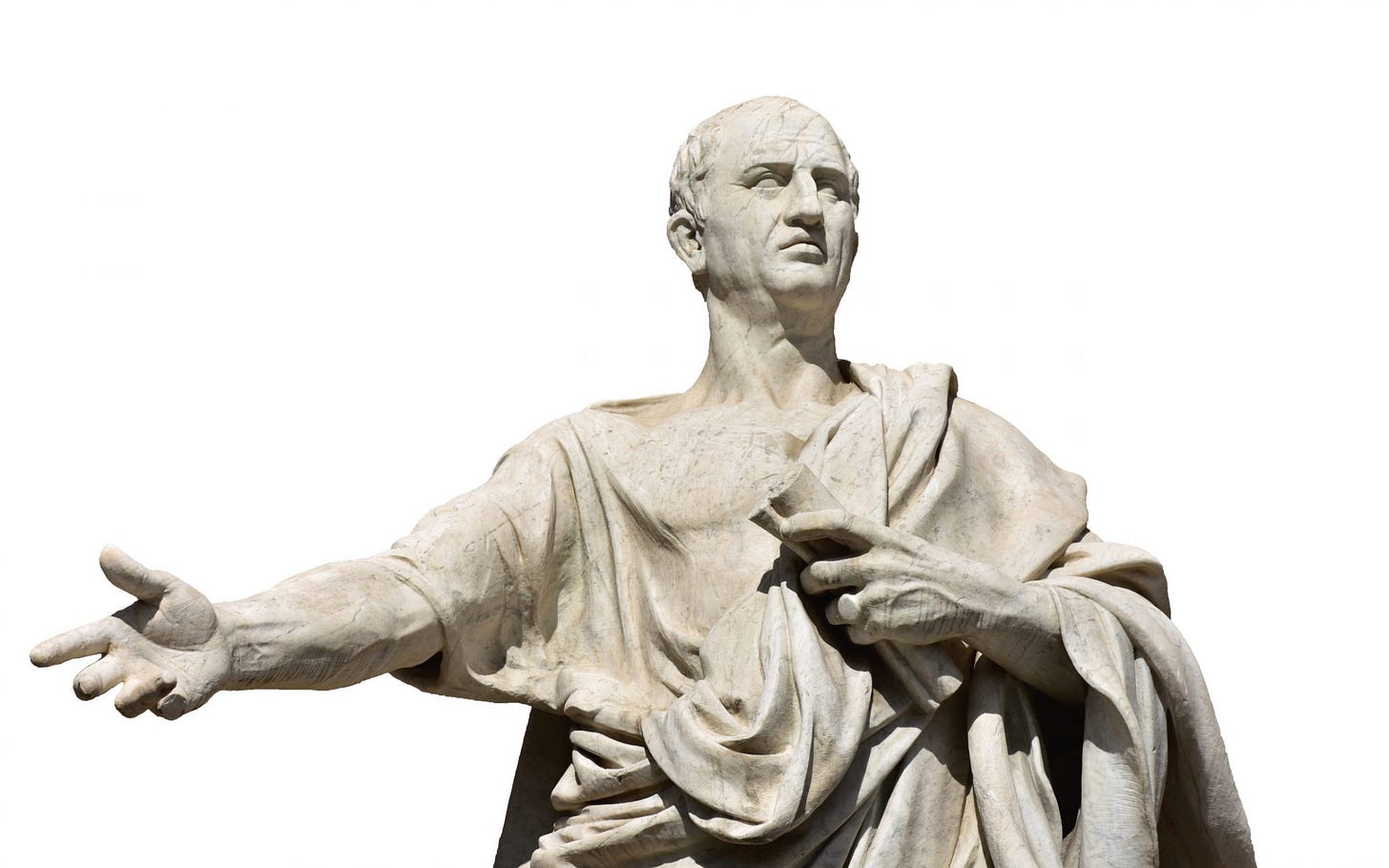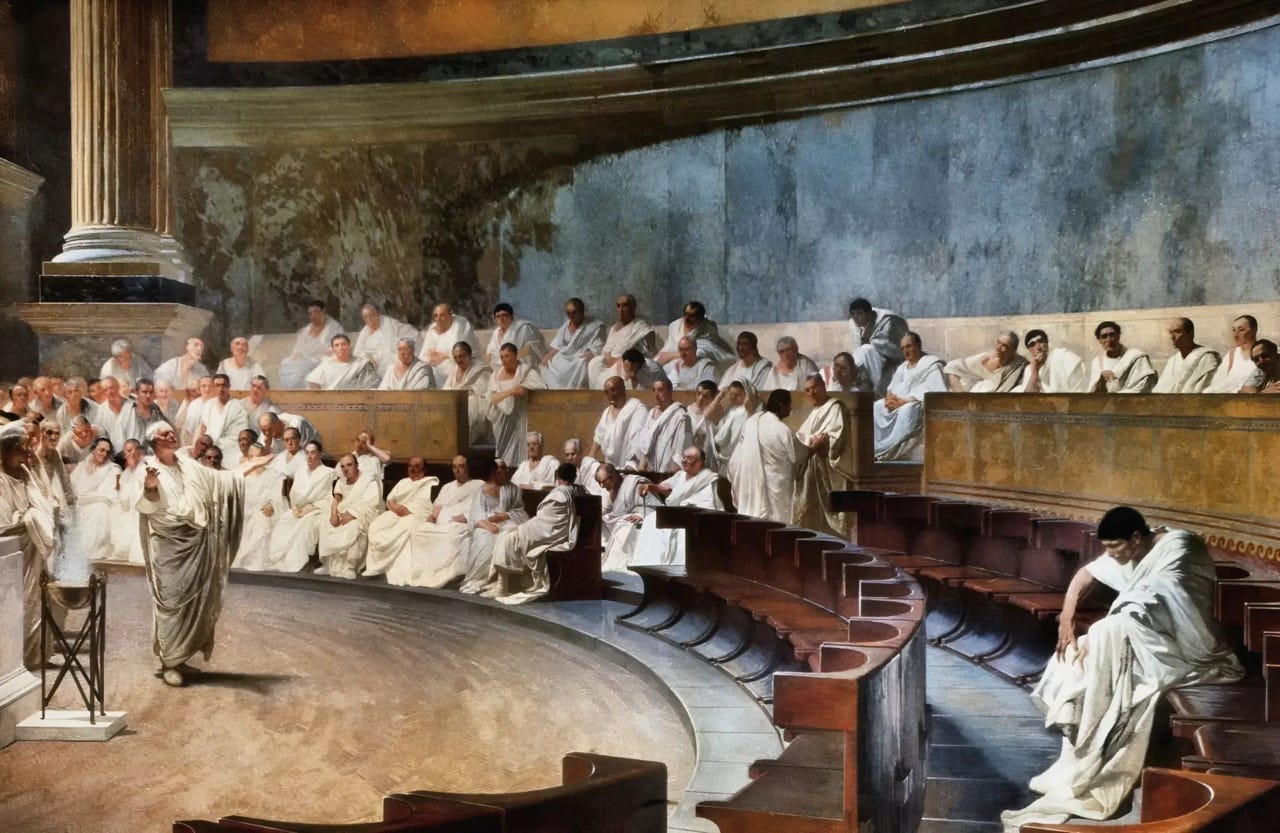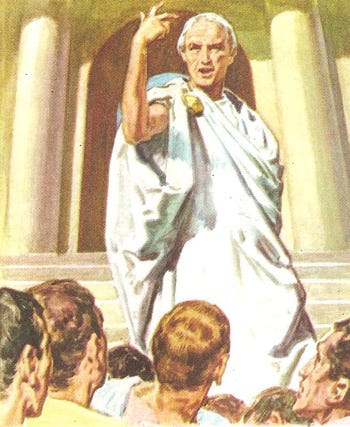How to Give a Speech
Secrets from Cicero
Dear Classical Wisdom Reader,
It’s the art of the argument.
The right words at the right time can have an enormous impact, and it’s from this power that the study of rhetoric emerged.
Although it’s not been without controversy.
A few weeks ago, we looked at the differing views of Aristotle and Plato regarding rhetoric.
Plato found the practice of rhetoric distasteful, believing arguments shouldn’t appeal to emotion. Aristotle, however, viewed it as something of a necessary evil; what good is it to be right if you can’t convince anyone of it?
So this week we’re looking at a third perspective, this time from the Roman orator Cicero. He wholeheartedly believed in using every possible theatrical technique at his disposal to add to the power of his speeches.
Discover some of Cicero’s secrets just below…
But first, you’ll want to hear about our upcoming webinar on the Homeric Hymn to Demeter.
Anya will be joined by Professor Diane Rayor to discuss one of the most enduring myths of ancient Greece, the tale of Hades, Persephone, and of course, her mother Demeter.
That’s on August 28th at Noon EST. You can register for that HERE.
Can’t join us live? Register in advance for the recording.
Also, if you’re interested in Homer, stay tuned for some very exciting news coming soon…
But for now, let us know: who do you agree with? Plato, Aristotle, or Cicero?
I just hope an argument doesn’t break out!
All the best,
Sean Kelly
Managing Editor
Classical Wisdom
Cicero’s Secrets for Giving Speeches
By Ben Shehadi
Public speaking, everyone hates it.
It is routinely cited as one of people’s worst fears, sometimes ranked even worse than death. Yet as with many of life’s problems, the ancient Romans have the answers. The great Cicero, one of Rome’s most eloquent and charismatic public speakers, left behind a manual on how to become a good speaker yourself. It is called On the Orator.
Roman trials
The ancient Romans loved to use legal trials as a form of public entertainment. There were no professional lawyers, so anyone with good speaking skills could prosecute the accused. Doing so was a common way for people to make themselves famous. Especially in the Late Republic, celebrity trials were very common, such as those against politicians. Crowds were not passive spectators either; they applauded and booed. They even threw rotten fruit at the accused! Cicero’s book, On the Orator, was designed to teach people how to become de facto lawyers in front of tempestuous crowds.
What Cicero says
In On the Orator, Cicero gives several pieces of advice. The key to Cicero’s advice is this: Sound logic doesn’t always win arguments. Human beings are moved by emotion, not logic.
According to the great Roman speaker, you need to whip up the crowd into an emotional frenzy. Appealing to logic simply doesn’t work. You need to make them feel strong emotion. Make them sad, or angry, or alarmed. If you arouse their emotions, facts and evidence no longer matter. In On the Orator, Cicero writes,
“To sway the audience’s emotions is victory; for among all things it is the single most important in winning verdicts. Nothing else is more important than emotion.”
Use visual aids
Cicero’s first tip is to use props and visual aids. Many times, Cicero himself used statues of the Roman gods to increase the emotional appeal of his words. The Roman Forum was full of these religious statues, which were often exploited by clever and cunning speakers. Heroes, gods, and personifications of virtues were popular images. In cases of violent crime, the Romans would commission paintings, which made the accused look more guilty and sinister.
Props related to the crime were often used. But for Cicero, props were not just inanimate objects. Even other people could be used as props. On one occasion, as Cicero was defending a client, he gave the speech while holding the person’s baby in his arms. “The entire Forum was filled with sobs and tears,” Cicero tells us.
Another time, again defending a client, Cicero used the man’s handsome young son as a prop. He repeatedly drew the jury’s attention to the boy. When defending less good-looking clients, Cicero would use the accused’s elderly parents as props. This was done to gain the sympathy of the crowd, dissuading them from convicting the accused.
Similarly, after Caesar’s assassination, Mark Antony used a wax statute to demonstrate all of the body wounds inflicted on Caesar in gruesome detail. This whipped up the crowd in fury, who angrily called to avenge Caesar’s death.
Make it memorable
The second tip from Cicero is to use rhymes, or at least rhythm, to make your speech more memorable. Cicero especially used rhymes to emphasize the most important parts of his speeches. It’s much like how during the OJ Simpson trial Johnnie Cochran famously declared, “If the glove doesn’t fit, you must acquit.”
Similarly, Cicero was a big fan of using repetition as well, as it allows points to stick better.
So: repeat, repeat, repeat. Then repeat again. Today, marketers use this technique all the time in catchy jingles and repetitive slogans to sell their products.
Of course, Cicero himself used many of these tricks that he recommended to his readers. In 63 BC, during the Catiline conspiracy, the Roman consul gave numerous speeches denouncing his enemy. In his Second Oration, Cicero declared,
“Catiline, raging with audacity, breathing wickedness, evilly plotting the destruction of his country, threatening this city and ourselves with fire and sword, has at long last been expelled from Rome.”
He continues,
“He is gone. He has fled. He has escaped. He has run away. No longer will that unnatural fiend be within the walls, devising schemes to demolish those same walls.”
This except is full of Cicero’s tricks. It is full of repetition and jarring emotional language, designed to inflame the crowds against Catiline.
Destroy your enemy’s reputation
Another one of Cicero’s favorite rhetorical tactics was guilt by association. He listed people’s friends to make them appear sketchy and untrustworthy. The best part of this strategy is that you can avoid directly attacking the person. There is plausible deniability, because the targets of the attack are the person’s friends, not the person himself.
Similarly, Cicero loved to use exaggeration in his speeches. In order to make Catiline look worse, Cicero accused him of committing all kinds of other unrelated crimes. While the listeners might not believe you, they will usually walk away thinking that the accused is guilty of at least a couple of those crimes. It is an easy way to destroy your enemy’s reputation.
Fear-mongering
Cicero was great at making his audience feel afraid. In his speeches against Catiline, he conjured up frightening images of fire, destruction, chaos and civil war. He insisted that there could be no neutrality in the debate. There was no nuance in his arguments. Anyone who aligned with Catiline was accused of being a traitor or unpatriotic. Extreme polarization, both in Cicero’s day and now, is always a useful political strategy.
Humor
Audiences love to laugh and be entertained, so Cicero says to always use humor. He often mocked his opponents’ physical appearance, such as bad haircuts, being fat, moles, talking with a lisp, bad acne, physical disabilities, hair loss—anything that you can laugh at.
On one occasion, Cicero even made fun of somebody’s ugly children. Cicero also used verbal puns to make fun of his opponents’ names. For example, Julius Caesar, who was especially sensitive about his receding hairline, was routinely mocked by Cicero, because the root of Caesar’s name means “hairy”.
Gestures
In Ancient Rome, there were no microphones. So to fix this, speakers developed an elaborate form of sign language. Unlike today’s sign language, Roman orators used gestures to add emotional gloss to the words. It was a way to visibly tell your listeners how to feel, even if they didn’t actually hear what you said. Cicero was always very strict about using gestures in public speaking. In his history of Roman oratory, called Brutus, Cicero even berated a speaker for failing to use gestures.
“There was no trace of agitation in you, neither of mind nor of body. Did you smite your brow? Did you slap your thigh, or at least stamp your foot? No! In fact, so far from touching my feelings, I could scarce refrain from going to sleep then and there.”
On another occasion, the great Roman orator praised the use of good gestures. “Your wagging finger made me tremble with emotion,” he wrote in On the Orator. Yet gestures are not unambiguously good either, in Cicero’s view. Too much gesturing, or awkward gestures, make you look undignified and clownish.
Delivery
Finally, for Cicero, the delivery of a speech was the most important thing.
Cicero urged his readers to always deliver speeches in a lively and engaging way. He agreed with Demosthenes, the ancient Athenian orator who was once asked the three secrets of giving good speeches. “Delivery, delivery, delivery” was the Greek orator’s response.
Even a bad speech can be delivered well. At the same time, even the best-written speech is worth nothing without a good delivery.






'Sound logic doesn’t always win arguments. Human beings are moved by emotion, not logic' - This bit still rings undeniably true! Something tells me Cicero would get on quite well as a modern politician 🙄
Difficult not to lose a lot of respect for Cicero after reading this essay. The philosophy of - winning is the only thing that matters, truth and process be damned - especially in the legal system just feels morally reprehensible.